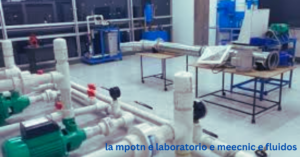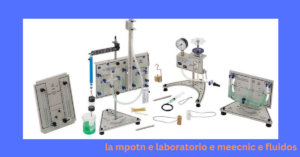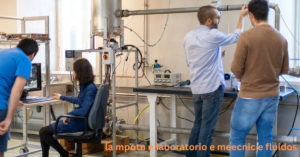la mpotn e laboratorio e meecnic e fluidos: The Future Benefits of La Motone Laboratory in Mechanics and Fluid DynamicsA laboratorio is a place for science and experiments. It helps people study and test ideas. In this topic, it focuses on mechanics and fluids.How do fluids move, and why do they matter? This question is key to solving big problems. Let’s explore this fascinating topic together.“La mpotn e laboratorio e meecnic e fluidos” is about learning how fluids behave. It also shows how mechanics improves designs. This helps build a better future.
What is “La Motone Laboratory”?
“La Motone Laboratory” is a special place where engineers and scientists study fluids and mechanics. It’s a space filled with tools and machines that test how liquids and gases move. Researchers use it to solve problems in transportation, energy, and other industries. This laboratory is essential for creating better technology. It helps improve cars, planes, and even energy systems. By studying fluid movements, experts can make machines faster, safer, and more efficient. La Motone Laboratory is where big ideas come to life.
This laboratory is essential for creating better technology. It helps improve cars, planes, and even energy systems. By studying fluid movements, experts can make machines faster, safer, and more efficient. La Motone Laboratory is where big ideas come to life.
Mechanics in Fluids
Mechanics is about how things move. In the case of fluids, it asks, “How does this liquid or gas move? Why does it act this way?” Imagine watching a river flow or air blowing through your window. Scientists use advanced tools to study these movements and find ways to make machines work better.
Why Study Fluid Mechanics?
Fluid mechanics is important because fluids are everywhere in our daily lives. From the water flowing in pipes to the air we breathe, fluids play a big role. By studying them, engineers learn how to design systems that work better and save energy. This helps us in many ways, like improving how we get clean water or build safer vehicles.Understanding fluid mechanics also helps us protect the environment. It is used to create clean energy, like wind and hydroelectric power. Engineers also use it to reduce fuel use in transportation. Studying this subject is key to solving many of the world’s problems.
Tools and Equipment Used in Laboratories
Labs like “La Motone” are packed with all kinds of tools. Some are small and simple, while others are big and powerful. These tools help researchers test ideas and learn faster. Let’s look at some examples.
Common Tools
 Common tools include pumps, pipes, and valves. Pumps move water or air from one place to another. Pipes guide where the fluids go. Valves let researchers control how fast or slow the fluids flow. These are the basics every lab needs.
Common tools include pumps, pipes, and valves. Pumps move water or air from one place to another. Pipes guide where the fluids go. Valves let researchers control how fast or slow the fluids flow. These are the basics every lab needs.
Advanced Technology in Laboratories
Now, let’s talk about the high-tech stuff. Labs today use 3D printers and supercomputers to speed up experiments. These advanced tools let scientists test new ideas in hours instead of months. It’s like having a superpower!
Research Areas in Fluid Mechanics
Fluid mechanics focuses on solving problems related to how liquids and gases move. One key research area is hydraulics, which studies fluids under pressure. This research helps create efficient systems like water pumps, car brakes, and heavy machinery. It also plays a major role in irrigation and managing water resources for agriculture.Another  critical area is aerodynamics, which explores how air flows around objects. This research improves the design of planes, cars, and even sports equipment. By understanding aerodynamics, engineers make vehicles faster, safer, and more energy-efficient. Both areas show how fluid mechanics helps shape technology and our world.
critical area is aerodynamics, which explores how air flows around objects. This research improves the design of planes, cars, and even sports equipment. By understanding aerodynamics, engineers make vehicles faster, safer, and more energy-efficient. Both areas show how fluid mechanics helps shape technology and our world.
Hydraulics
Hydraulics is all about fluids under pressure. For example, the brakes in your car use hydraulic systems to stop the car quickly. Engineers study hydraulics to make vehicles safer and more reliable.
Aerodynamics
Aerodynamics focuses on air and how it moves around objects. Planes fly because of aerodynamics. Engineers use wind tunnels to see how air moves over wings. This helps them design faster, safer, and more fuel-efficient planes.
Benefits of Fluid Mechanics for the Future
Fluid mechanics offers solutions to many future challenges. It plays a big role in clean energy, like wind turbines and hydroelectric power, helping us create sustainable energy systems. It also improves transportation by making cars, planes, and ships faster and more fuel-efficient. Understanding fluid mechanics helps design safer structures, like dams and bridges, that can withstand natural forces. Additionally, it aids in creating better medical devices, such as pumps for heart surgeries. Fluid mechanics is essential for building a smarter, greener, and more efficient future.
Sustainable Energy
Clean energy is the future. Wind turbines and hydroelectric dams rely on fluid mechanics to work efficiently. By improving these systems, we can create more power while wasting less energy.
Transportation Improvements
How do cars get faster and safer? Or how do ships use less fuel? It’s all thanks to fluid mechanics. Engineers use this knowledge to make transportation smarter and more eco-friendly.
Skills Needed for Success in This Field
Thinking about a career in fluid mechanics? Here are some important skills you’ll need.
Problem-Solving
Engineers face problems all the time. Maybe a pump isn’t working, or a fluid isn’t flowing as expected. To fix these issues, they need to come up with quick and clever solutions.
Critical Thinking
Fluid mechanics is like solving a giant puzzle. Engineers need to think logically and use science to understand why things happen. This helps them find the best solutions.
Challenges in Fluid Mechanics Studies
Studying fluid mechanics isn’t always easy. There are challenges that students and researchers must overcome.
Complex Calculations
Math is everywhere in fluid mechanics. Some of the equations are really tough. But with practice, it gets easier. And hey, calculators are always there to help!
Equipment Maintenance
The tools in a lab can be expensive. If they break, experiments can’t continue. Engineers must know how to maintain and repair these tools to keep their research on track.
Conclusion
Fluid mechanics is an exciting field that helps us build a better future. From creating clean energy to designing safer transportation, its impact is huge. With places like “La Motone Laboratory,” engineers can test ideas and learn faster than ever. If you enjoy solving problems and making the world better, this field is definitely for you.
Frequently Asked Questions
What are fluids?
Fluids are substances that can flow, like water or air.
Why are labs like “La Motone” important?
They help researchers test ideas and improve designs.
How do fluids help in transportation?
Fluids are studied to improve speed, safety, and fuel efficiency in vehicles.
Is studying fluid mechanics hard?
It can be challenging, but it’s also rewarding and fun!
What jobs use fluid mechanics?
Jobs in energy, transportation, and even space exploration rely on fluid mechanics.



